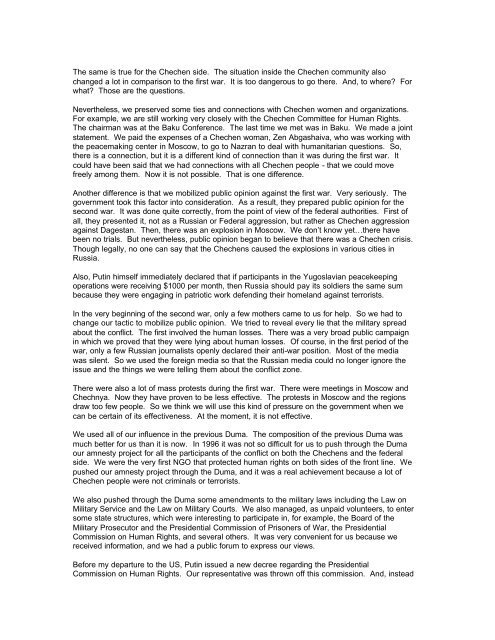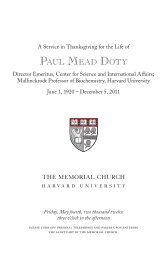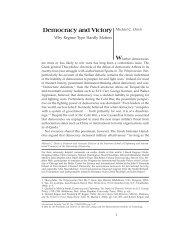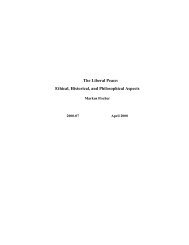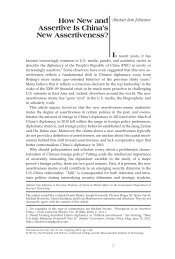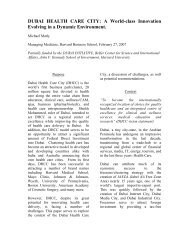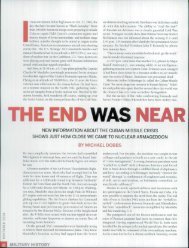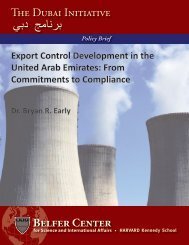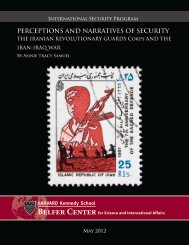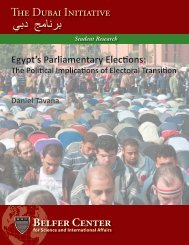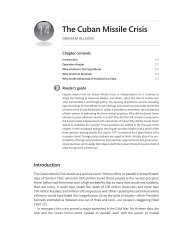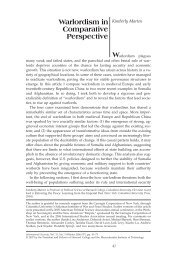Civil Society and Peace-building in the North and South Caucasus ...
Civil Society and Peace-building in the North and South Caucasus ...
Civil Society and Peace-building in the North and South Caucasus ...
Create successful ePaper yourself
Turn your PDF publications into a flip-book with our unique Google optimized e-Paper software.
The same is true for <strong>the</strong> Chechen side. The situation <strong>in</strong>side <strong>the</strong> Chechen community also<br />
changed a lot <strong>in</strong> comparison to <strong>the</strong> first war. It is too dangerous to go <strong>the</strong>re. And, to where? For<br />
what? Those are <strong>the</strong> questions.<br />
Never<strong>the</strong>less, we preserved some ties <strong>and</strong> connections with Chechen women <strong>and</strong> organizations.<br />
For example, we are still work<strong>in</strong>g very closely with <strong>the</strong> Chechen Committee for Human Rights.<br />
The chairman was at <strong>the</strong> Baku Conference. The last time we met was <strong>in</strong> Baku. We made a jo<strong>in</strong>t<br />
statement. We paid <strong>the</strong> expenses of a Chechen woman, Zen Abgashaiva, who was work<strong>in</strong>g with<br />
<strong>the</strong> peacemak<strong>in</strong>g center <strong>in</strong> Moscow, to go to Nazran to deal with humanitarian questions. So,<br />
<strong>the</strong>re is a connection, but it is a different k<strong>in</strong>d of connection than it was dur<strong>in</strong>g <strong>the</strong> first war. It<br />
could have been said that we had connections with all Chechen people - that we could move<br />
freely among <strong>the</strong>m. Now it is not possible. That is one difference.<br />
Ano<strong>the</strong>r difference is that we mobilized public op<strong>in</strong>ion aga<strong>in</strong>st <strong>the</strong> first war. Very seriously. The<br />
government took this factor <strong>in</strong>to consideration. As a result, <strong>the</strong>y prepared public op<strong>in</strong>ion for <strong>the</strong><br />
second war. It was done quite correctly, from <strong>the</strong> po<strong>in</strong>t of view of <strong>the</strong> federal authorities. First of<br />
all, <strong>the</strong>y presented it, not as a Russian or Federal aggression, but ra<strong>the</strong>r as Chechen aggression<br />
aga<strong>in</strong>st Dagestan. Then, <strong>the</strong>re was an explosion <strong>in</strong> Moscow. We don’t know yet…<strong>the</strong>re have<br />
been no trials. But never<strong>the</strong>less, public op<strong>in</strong>ion began to believe that <strong>the</strong>re was a Chechen crisis.<br />
Though legally, no one can say that <strong>the</strong> Chechens caused <strong>the</strong> explosions <strong>in</strong> various cities <strong>in</strong><br />
Russia.<br />
Also, Put<strong>in</strong> himself immediately declared that if participants <strong>in</strong> <strong>the</strong> Yugoslavian peacekeep<strong>in</strong>g<br />
operations were receiv<strong>in</strong>g $1000 per month, <strong>the</strong>n Russia should pay its soldiers <strong>the</strong> same sum<br />
because <strong>the</strong>y were engag<strong>in</strong>g <strong>in</strong> patriotic work defend<strong>in</strong>g <strong>the</strong>ir homel<strong>and</strong> aga<strong>in</strong>st terrorists.<br />
In <strong>the</strong> very beg<strong>in</strong>n<strong>in</strong>g of <strong>the</strong> second war, only a few mo<strong>the</strong>rs came to us for help. So we had to<br />
change our tactic to mobilize public op<strong>in</strong>ion. We tried to reveal every lie that <strong>the</strong> military spread<br />
about <strong>the</strong> conflict. The first <strong>in</strong>volved <strong>the</strong> human losses. There was a very broad public campaign<br />
<strong>in</strong> which we proved that <strong>the</strong>y were ly<strong>in</strong>g about human losses. Of course, <strong>in</strong> <strong>the</strong> first period of <strong>the</strong><br />
war, only a few Russian journalists openly declared <strong>the</strong>ir anti-war position. Most of <strong>the</strong> media<br />
was silent. So we used <strong>the</strong> foreign media so that <strong>the</strong> Russian media could no longer ignore <strong>the</strong><br />
issue <strong>and</strong> <strong>the</strong> th<strong>in</strong>gs we were tell<strong>in</strong>g <strong>the</strong>m about <strong>the</strong> conflict zone.<br />
There were also a lot of mass protests dur<strong>in</strong>g <strong>the</strong> first war. There were meet<strong>in</strong>gs <strong>in</strong> Moscow <strong>and</strong><br />
Chechnya. Now <strong>the</strong>y have proven to be less effective. The protests <strong>in</strong> Moscow <strong>and</strong> <strong>the</strong> regions<br />
draw too few people. So we th<strong>in</strong>k we will use this k<strong>in</strong>d of pressure on <strong>the</strong> government when we<br />
can be certa<strong>in</strong> of its effectiveness. At <strong>the</strong> moment, it is not effective.<br />
We used all of our <strong>in</strong>fluence <strong>in</strong> <strong>the</strong> previous Duma. The composition of <strong>the</strong> previous Duma was<br />
much better for us than it is now. In 1996 it was not so difficult for us to push through <strong>the</strong> Duma<br />
our amnesty project for all <strong>the</strong> participants of <strong>the</strong> conflict on both <strong>the</strong> Chechens <strong>and</strong> <strong>the</strong> federal<br />
side. We were <strong>the</strong> very first NGO that protected human rights on both sides of <strong>the</strong> front l<strong>in</strong>e. We<br />
pushed our amnesty project through <strong>the</strong> Duma, <strong>and</strong> it was a real achievement because a lot of<br />
Chechen people were not crim<strong>in</strong>als or terrorists.<br />
We also pushed through <strong>the</strong> Duma some amendments to <strong>the</strong> military laws <strong>in</strong>clud<strong>in</strong>g <strong>the</strong> Law on<br />
Military Service <strong>and</strong> <strong>the</strong> Law on Military Courts. We also managed, as unpaid volunteers, to enter<br />
some state structures, which were <strong>in</strong>terest<strong>in</strong>g to participate <strong>in</strong>, for example, <strong>the</strong> Board of <strong>the</strong><br />
Military Prosecutor <strong>and</strong> <strong>the</strong> Presidential Commission of Prisoners of War, <strong>the</strong> Presidential<br />
Commission on Human Rights, <strong>and</strong> several o<strong>the</strong>rs. It was very convenient for us because we<br />
received <strong>in</strong>formation, <strong>and</strong> we had a public forum to express our views.<br />
Before my departure to <strong>the</strong> US, Put<strong>in</strong> issued a new decree regard<strong>in</strong>g <strong>the</strong> Presidential<br />
Commission on Human Rights. Our representative was thrown off this commission. And, <strong>in</strong>stead


